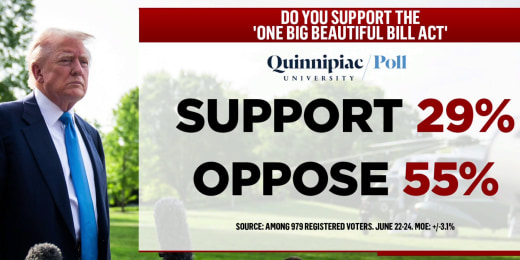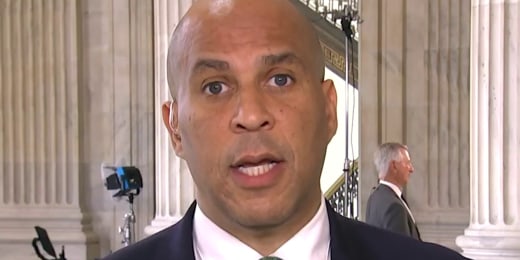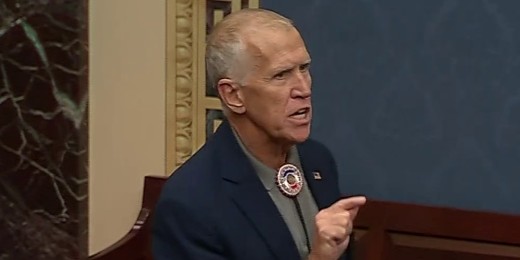The Dictatorship
States brace for impact as Trump’s big bill nears completion in Congress

JEFFERSON CITY, Mo. (AP) — President Donald Trump’s big bill to cut taxes and reduce federal spending on some social safety net programs could have large implications for states, but for many it’s too late to do much about it this year.
Tuesday marks the start of a new budget year in 46 states. Though some legislatures are still working, most already have adjourned and finalized their spending plans without knowing whether federal funding will be cut and, if so, by how much.
“The ebb and flow of rumors and reality have created great uncertainty and some anxiety in state governments,” said David Adkins, executive director of The Council of State Governments.
Several states have taken preemptive steps, setting aside money in reserves or tasking committees to monitor the impact of federal funding reductions. Others are tentatively planning to return in special sessions this year to account for potential funding cuts to joint federal-state programs such as Medicaid and the Supplemental Nutrition Assistance Program, or SNAP. Others will have to wait until their legislatures are back in session next year.
What’s at stake for states?
“If there are significant cuts, states wouldn’t be able to fully absorb those,” said Brian Sigritz, director of state fiscal studies at the National Association of State Budget Officers.
Nationally, the Medicaid health care program for lower-income residents accounts for 30% of total state expenditures, according to the health policy research organization KFF. That makes it the costliest program in many states, ahead of even K-12 education. The bulk of Medicaid money comes from the federal government, meaning any changes in federal policy can create big ripples for states.
Legislation pending in Congress would affect Medicaid in several ways. New work requirements are expected to reduce enrollment by millions of people, while other proposed changes also could reduce federal payments to states.
Until now the federal government also has covered the full cost of SNAP benefits and half the administrative costs. Trump’s bill would shift more of those costs to states, leaving them to either divert money from other purposes or trim back their food assistance programs.
The Medicaid and SNAP changes are just the latest in a series of Trump policies affecting state finances, including the rollback of grants for transportation and high-speed internet projects and attempts to withhold federal funds from sanctuary jurisdictions that limit cooperation with federal immigration authorities.
Some legislatures are stocking up on savings
A surge in federal aid and state tax revenue during the coronavirus pandemic led to booming budgets and historic cash surpluses in many states. As revenues slow and those surpluses get spent, some states now are trying to guard against federal funding reductions.
New Mexico enacted a law this year creating a Medicaid trust fund gradually stocked with up to $2 billion that can be tapped to prop up the program if federal funding cuts would otherwise cause a reduction in coverage or benefits.
Hawaii lawmakers, in crafting the state’s budget, left an extra $200 million in the general fund as a contingency against federal funding uncertainty. They plan to return for a special session.
And Vermont’s budget sets aside up to $110 million in case federal funding is cut. That includes $50 million that can be spent while the Legislature is not in session and up to $60 million that could be appropriated in the future to address federal funding shortfalls.
Though not necessarily tied to federal cuts, Florida lawmakers approved a proposed constitutional amendment that would set aside $750 million a year — or an amount equal to up to 25% of the state’s general revenue, whichever is less — in a reserve fund that lawmakers could use for emergencies. That measure still must go before voters.
Some governors are cutting back on spending
Because of legislative deadlines, some state lawmakers had to craft budgets well before the details of Trump’s bill took shape.
Virginia lawmakers passed a budget in February for their fiscal year that starts Tuesday. Republican Gov. Glenn Youngkin announced several dozen line-item vetoes in May with the goal of creating a roughly $900 million financial cushion.
“There are some short-term risks as President Trump resets both fiscal spending in Washington and trade policies that require us to be prudent and not spend all of the projected surplus before we bank it,” Youngkin said in a statement.
Republican Missouri Gov. Mike Kehoe on Monday vetoed or froze about $500 million of general fund budget items, citing a need “to rein in unsustainable spending” and guard against a projected future shortfall.
Other states also have left money unspent, even though it has not always been touted as a buffer against federal cuts.
States are “enacting really cautious budgets, knowing that they may have to kind of revise them in special sessions or address changes in next year’s sessions,” said Erica MacKellar, a fiscal affairs program principal at the National Conference of State Legislatures.
Some are taking a wait-and-see approach
Before adjourning their sessions, some state legislatures established procedures to monitor federal funding cuts and recommend budgetary changes.
Montana’s budget includes $50,000 for an analysis of the financial implications of federal actions, but that spending kicks in only upon the cancellation of at least $50 million of previously approved federal funding or the anticipated loss of at least $100 million of future revenue.
If federal funding to Maryland decreases by at least $1 billion, a provision approved by lawmakers requires the state budget office to submit a report to the General Assembly with proposed actions and potential spending reductions.
The spending plan passed by Connecticut lawmakers also requires the state budget office to respond quickly to federal reductions by identifying state funds that could be used to preserve programs, particularly those providing health care, food assistance, education and other priorities.
North Dakota lawmakers left room for more work. They adjourned their biennial session six days shy of their 80-day limit, allowing time to reconvene if needed.
The Dictatorship
Trump’s plans for Americans’ data become clearer – and leave tech experts alarmed

Happy Tuesday. Here’s your Tuesday Tech Dropthe past week’s top stories from the intersection of technology and politics.
Trump’s data dreams
In recent months, there’s been widespread speculation over the Trump administration’s reported plans to work with controversial tech company Palantir to compile a massive database of Americans’ personal information. Now we have a bit of clarity on how some of that data could be used.
NPR reported Monday that the administration has developed a national citizenship data system that it wants states to use to crack down on noncitizen voters — a fascination of Donald Trump’s, despite the lack of evidence that such voters have affected the result of any U.S. election. One wonders whether and how this tool might be used to fuel Trump’s conspiracy theories.
Experts have raised concerns about the accuracy of the data being used, as well as whether this administration — which is currently trying to ramp up efforts to strip some Americans of their citizenship — can be trusted to deploy this tool ethically.
Read more at NPR.
Canada axes digital tax
Trump did the bidding of large tech companies when he said Friday that he was ending trade negotiations with Canada in response to the country’s digital services tax on tech companies — foreign and domestic — that was set to go into effect on the last day of June. Canada then rescinded the tax.
Read more at CNBC.
AI moratorium’s mortality
After a tentative deal appeared to have been reached between Sens. Ted Cruz, R-Texas, and Marsha Blackburn, R-Tenn., it appears a 10-year ban on states instituting regulations around artificial intelligence has been dropped from Republicans’ budget bill. For now.
Read more at Time.
Musk’s ‘fixer’ reportedly no longer at Tesla
One of the top executives at Tesla — Omead Afshar, who has been called Elon Musk’s “fixer” by The Wall Street Journal — has reportedly left the company. Tesla has been mired in a sales slump and ongoing tumult, partially stemming from backlash over Musk’s role in crafting Trump’s policies.
Read more at Forbes.
Bezos’ outreach to Trump
The Wall Street Journal reported that Amazon CEO Jeff Bezos has been cozying up to Trump, in an effort that the newspaper frames as an attempt to secure funding for Bezos’ aerospace company, Blue Origin, and capitalize on Trump’s rift with Musk.
Read more at The Wall Street Journal.
FTC puts its finger on the scale
Republicans have sought to crack the whip on companies that choose not to advertise on right-wing media platforms — in some cases, because said platforms have been known to promote hate speech. The Trump administration has made clear that it has no issue with holding up corporate mergers in order to extract political concessions, and that seems to have been the case last week when Trump’s handpicked FTC chairman announced that he was approving a merger of large advertising firms on the condition that the newly formed organization doesn’t take part in any ad boycotts based on political or ideological viewpoints.
Read more at Ars Technica.
Anti-ICE app
As Americans look for ways to navigate a country in which Immigration and Customs Enforcement agents — many of them masked — are seizing people off the streets and placing them in detention facilities, one developer has launched an app, ICEBlock, that tips people off as to where ICE agents have been sighted. The Trump administration, which has sought to crack down on reporting on ICE raids, clearly isn’t happy about this creation and responded — in dictatorial fashion — by threatening the app’s developer with DOJ scrutiny and even threatening CNN with prosecution for reporting on the app.
Read more at CNN.
The Dictatorship
The conservative wing of the Supreme Court just gave Democrats a potent weapon

In a string of cases Friday, the conservative justices on the Supreme Court handed the Republican Party win after win. The court restricted nationwide injunctions against President Donald Trump’s order on birthright citizenship, greatly hindering the powers of lower federal courts to constrain the president. It allowed parents to opt their kids out of public school education that offended their religious upbringing. And it let the state of Texas require age verification before anyone looks at online porn.
There is no question that each of these cases is a significant victory for conservatives in the short term. However, each also gives liberals an opening to try to accomplish their policy goals, but only if they are willing to be aggressive and break norms they’ve previously wanted to maintain.
Justice Sotomayor’s tit-for-tat warning was directed at the justices in the majority, but it could also be seen as an invitation to Democrats.
First, in the birthright citizenship case, the Supreme Court’s six Republican-appointed justices addressed a procedural question, not the issue of whether the president’s order rejecting the idea of birthright citizenship is unconstitutional (even though it clearly is under the Fourteenth Amendment and federal statutory law). On the procedural issue, the court held that lower federal court orders stopping the president’s unlawful actions could apply only to the people who brought those cases. In other words, even if a president issues a plainly unconstitutional order, all lower courts can do is provide relief to the individuals who had the foresight and resources to sue in federal court. The order cannot apply to everyone else in the country.
Yes, there are some exceptions. Cases can be brought as class actions, meaning a small number of people can bring the case on behalf of all other people in the country like them, but the court has spent the past two decades making such cases harder to bring. Also, states might be able to sue on behalf of their citizens and get nationwide relief under the theory that a citizen of, say, New Jersey, travels to other states and needs protection there. However, several justices have been skeptical of cases brought on behalf of others, so the future viability of such a strategy is unknown. Finally, never shy about giving itself more power, the Supreme Court said it can issue nationwide injunctions.
However, the court’s holding against universal injunctions from lower court judges is now the law of the land. And as a legal rule, in theory, this decision should apply in all cases regarding universal injunctions, not just cases brought against Republican policies. Justice Sonia Sotomayor recognized this in her dissenting opinion: “Today, the threat is to birthright citizenship. Tomorrow, a different administration may try to seize firearms from law-abiding citizens or prevent people of certain faiths from gathering to worship.”
Justice Sotomayor’s tit-for-tat warning was directed at the justices in the majority, but it could also be seen as an invitation to Democrats willing to push boundaries. The next Democrat in the Oval Office or even Democrats now in charge of state governments can look at the Supreme Court decision and take new actions knowing that lower courts shouldn’t have the power to issue nationwide or statewide injunctions stopping them.
A health care directive promoting reproductive freedom? An executive order forgiving student loans? A state initiative that restricts gun sales? A vaccination requirement that some religious people object to? An environmental directive that might infringe on some business’ claimed right? After Friday’s decision, even if these policies are challenged before very conservative federal judgesthose judges shouldn’t have the power to stop these Democratic actions beyond just the parties to the case, no matter how unlawful or unconstitutional these judges believe them to be.
Some or all of these actions might not survive the court’s eventual scrutiny.
Liberals can apply the same thinking to the Supreme Court’s ruling about LGBTQ+ books and religious exemptions. In that case, the conservative majority said that schools that teach books that burden parents’ religious beliefs violate the Constitution’s guarantee of free exercise of religion. In order to avoid this, schools must offer kids an opt-out so they aren’t forced to learn about gay marriage or trans people. Critics of the court’s decision worry that parents might cite their faith to push back against books that include depictions of interracial marriage, women in the workplace or evolution.
But liberals can have beliefs grounded in religion, too. Which means they, too, can throw a monkey wrench into the system on behalf of their liberal agenda. For instance, schools around the country are adopting “Baby Olivia” videos to promote anti-abortion views. A religious family who believes bodily autonomy and women’s rights are central to their religion can object and force the school to create an opt-out process.
Finally, there’s the age verification case involving online porn. In this case, the conservative justices said that while adults have the right to view pornography, minors don’t. Thus, Texas is allowed to put what the majority of the court viewed as a minimal burden on adults — the online age verification process — in order to stop minors from viewing porn, even though some adults viewed the process as violating their privacy.
Once again, liberals can play this game, as well. For instance, if Texas wants age verification for porn websites, California could require age verification for websites that sell or advertise guns.
Sure, some or all of these actions might not survive the court’s eventual scrutiny. Each of the doctrines at issue in these cases and hypotheticals have exceptions and complicated sub-rules. Moreover, if the Supreme Court doesn’t care about law and cares only about furthering a conservative ideological agenda, it will find a way to rule against liberal causes and politicians while ruling for conservatives.
But Democrats and liberals need to force the court’s hand by using these supposedly neutral rules to push their own agenda. The court may be tilted ideologically against them, but that doesn’t mean giving up ahead of time. Instead, they should use the tools given to them to accomplish their policy goals and dare the Supreme Court to display blatant hypocrisy by stopping them.
The Dictatorship
Jury reaches partial verdict in Sean Combs trial, unable to reach verdict on Count One


-

‘It’s all a big stunt’: Inside Trump’s cruel plans for ‘Alligator Alcatraz’
06:45
-

‘First time in our history we are rolling back care’: Top Democratic senator slams Trump’s megabill
09:19
-
Now Playing

-
UP NEXT

‘A political poison pill’: Republican Senators plow ahead with Trump’s deeply unpopular bill
11:15
-

‘An aggressive pen pal’: Trump says U.S. will send countries letters to set tariff rate
04:49
-

‘A moral obscenity’: Top Democrat sounds off on GOP hypocrisy over Trump’s megabill
11:06
-

INSIDE: How a community organization is fighting back as Los Angeles ICE raids ramp up
06:05
-

GOP Senator is ‘the best ad Democrats have going into midterms,’ rips Trump’s budget bill
11:32
-

‘We just don’t know’: Trump can’t accept successful strike, insists on ‘obliteration’
09:54
-

‘I will never forget what I saw’: Shocking new reporting from inside immigration detention centers
09:24
-

NEW: Top Democratic senator makes the case for how the party fights Trump on the economy
11:38
-

Nicolle Wallace breaks down Pete Hegseth’s meltdown and tantrum at Pentagon press conference
09:33
-

Why Nicolle Wallace says ‘this week is officially the F-U week of Trump’s second presidency’
09:55
-

‘They got caught in a lie’: Sen. Murphy on Trump and Hegseth’s meltdown over intel report on Iran
09:11
-

‘He didn’t sound like a politician’: Why Mamdani is poised to defeat Cuomo in NYC primary
05:09
-

Nicolle Wallace slams GOP on Medicaid cuts: ‘Mitch McConnell doesn’t give a you-know-what’
11:56
-

‘Never seen him like this’: Marine vet speaks out after shocking video of his father being beaten by ICE
11:15
-

‘You cannot bomb your way out of this’: Rep. Jason Crow on Trump Administration’s intel missteps
12:00
-

Trump’s claims that Iran nuclear program was ‘obliterated’ called into question
11:48
-

‘A bum’: Trump looks to oust GOP Congressman for publicly opposing Iranian nuclear strikes
06:57
-

‘It’s all a big stunt’: Inside Trump’s cruel plans for ‘Alligator Alcatraz’
06:45
-

‘First time in our history we are rolling back care’: Top Democratic senator slams Trump’s megabill
09:19
-
Now Playing

Jury reaches partial verdict in Sean Combs trial, unable to reach verdict on Count One
06:54
-
UP NEXT

‘A political poison pill’: Republican Senators plow ahead with Trump’s deeply unpopular bill
11:15
-

‘An aggressive pen pal’: Trump says U.S. will send countries letters to set tariff rate
04:49
-

‘A moral obscenity’: Top Democrat sounds off on GOP hypocrisy over Trump’s megabill
11:06
-

 The Josh Fourrier Show8 months ago
The Josh Fourrier Show8 months agoDOOMSDAY: Trump won, now what?
-
Uncategorized8 months ago
Bob Good to step down as Freedom Caucus chair this week
-

 Politics8 months ago
Politics8 months agoWhat 7 political experts will be watching at Tuesday’s debate
-

 Politics8 months ago
Politics8 months agoHow Republicans could foil Harris’ Supreme Court plans if she’s elected
-
Economy8 months ago
Fed moves to protect weakening job market with bold rate cut
-
Economy8 months ago
It’s still the economy: What TV ads tell us about each campaign’s closing message
-

 Politics8 months ago
Politics8 months agoRFK Jr.’s bid to take himself off swing state ballots may scramble mail-in voting
-
Uncategorized8 months ago
Johnson plans to bring House GOP short-term spending measure to House floor Wednesday


